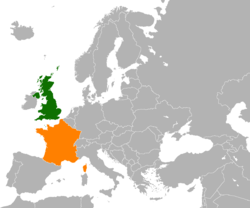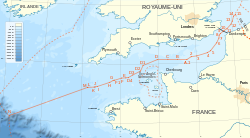
A | B | C | D | E | F | G | H | CH | I | J | K | L | M | N | O | P | Q | R | S | T | U | V | W | X | Y | Z | 0 | 1 | 2 | 3 | 4 | 5 | 6 | 7 | 8 | 9
 | |
United Kingdom |
France |
|---|---|
| Diplomatic mission | |
| Embassy of the United Kingdom, Paris | Embassy of France, London |
| Envoy | |
| Ambassador Menna Rawlings | Ambassador Hélène Tréheux-Duchêne |

The historical ties between France and the United Kingdom, and the countries preceding them, are long and complex, including conquest, wars, and alliances at various points in history. The Roman era saw both areas largely conquered by Rome, whose fortifications largely remain in both countries to this day. The Norman conquest of England in 1066 decisively shaped the English language and led to early conflict between the two nations.
Throughout the Middle Ages and into the Early Modern Period, France and England were often bitter rivals, with both nations' monarchs claiming control over France and France routinely allying against England with their other rival Scotland until the Union of the Crowns. The historical rivalry between the two nations was seeded in the Capetian-Plantagenet rivalry over the French holdings of the Plantagenets in France. After the French victory in the Hundred Years' War, England would never again establish a foothold in French territory.
Rivalry continued with many Anglo-French wars. The last major conflict between the two was the French Revolutionary and Napoleonic Wars (1793–1815), in which coalitions of European powers, financed and usually led by London, fought a series of wars against the French First Republic, the First French Empire and its client states, culminating in the defeat of Napoleon in 1815. For several decades the peace was uneasy with fear of French invasion in 1859 and during the later rivalry for African colonies. Nevertheless, peace has generally prevailed since Napoleon I, and friendly ties between the two were formally established with the 1904 Entente Cordiale, and the British and French were allied against Germany in both World War I and World War II; in the latter conflict, British armies helped to liberate occupied France from Nazi Germany.
France and the UK were key partners in the West during the Cold War, consistently supporting liberal democracy and capitalism. They were founding members of the North Atlantic Treaty Organization (NATO) defence alliance and are permanent members of the UN Security Council. France has been a member of the European Union (EU), and its predecessors, since creation as the European Economic Community in 1957. In the 1960s, relations deteriorated due to French President Charles de Gaulle's concerns over the special relationship between the UK and the United States. He repeatedly vetoed British entry into the European Communities, the predecessor to the EU, and withdrew France from NATO integrated command, arguing the alliance was too heavily dominated by the United States.
In 1973, following de Gaulle's death, the UK entered the European Communities and in 2009 France returned to an active role in NATO. Since then, the two countries have experienced a close relationship, especially on defence and foreign policy issues; however they disagreed on several other matters, most notably the direction of the European Union.[1] The United Kingdom left the European Union on 31 January 2020, following the referendum held on 23 June 2016, on Brexit.[2] Relations have since deteriorated, with disagreements surrounding Brexit and the English Channel migrant crisis.[3][4][5]
In the 21st century, France and Britain, though they have chosen different paths and share many overlooked similarities (with roughly the same population, economic size, commitment to democracy, diplomatic clout, and as heads of former global empires.[6][7][8][9]), are often still referred to as "historic rivals",[10] with a perceived ever-lasting competition.[11] French author José-Alain Fralon characterised the relationship between the countries by describing the British as "our most dear enemies".
Zdroj:https://en.wikipedia.org?pojem=France–United_Kingdom_relations
Text je dostupný za podmienok Creative Commons Attribution/Share-Alike License 3.0 Unported; prípadne za ďalších podmienok. Podrobnejšie informácie nájdete na stránke Podmienky použitia.
Antropológia
Aplikované vedy
Bibliometria
Dejiny vedy
Encyklopédie
Filozofia vedy
Forenzné vedy
Humanitné vedy
Knižničná veda
Kryogenika
Kryptológia
Kulturológia
Literárna veda
Medzidisciplinárne oblasti
Metódy kvantitatívnej analýzy
Metavedy
Metodika
Text je dostupný za podmienok Creative
Commons Attribution/Share-Alike License 3.0 Unported; prípadne za ďalších
podmienok.
Podrobnejšie informácie nájdete na stránke Podmienky
použitia.
www.astronomia.sk | www.biologia.sk | www.botanika.sk | www.dejiny.sk | www.economy.sk | www.elektrotechnika.sk | www.estetika.sk | www.farmakologia.sk | www.filozofia.sk | Fyzika | www.futurologia.sk | www.genetika.sk | www.chemia.sk | www.lingvistika.sk | www.politologia.sk | www.psychologia.sk | www.sexuologia.sk | www.sociologia.sk | www.veda.sk I www.zoologia.sk



